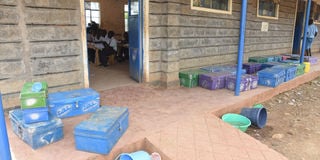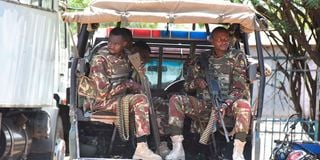Premium
Why teaching in bandit-prone Baringo villages is not for the faint of heart

Pupils at Kapindasum Primary School in Baringo South lie on the floor for safety after bandits attacked near the school on October 24, 2023.
What you need to know:
- The rough terrain and deep trenches arising from soil erosion have provided the armed criminals with hideouts from where they ambush security personnel and civilians.
- More than 30 teachers have deserted schools in insecurity-prone villages, paralyzing learning. Most of them are non-local teachers who are often targeted.
Primary school teacher Nehemiah Lekwaro commutes to work every day from his home in the village of Kiserian, about 10 kilometres away.
The village is in Baringo South, a region where banditry activities are prevalent. Despite the glaring insecurity challenges that stare at him daily, the Noosukro Primary School school deputy headteacher never misses school, always taking risks to attend to learners at the remote institution.
Six of his colleagues and the headteacher reside in the school, where they convert classes to dormitories at night.
Last Thursday, February 22, however, Lekwaro came face-to-face with the ugly side of banditry by criminals, who roam the area freely and escaped death by a whisker.
He had boarded a boda boda at his school and with the escort of National Police Reservist (NPR) Robin Lechuta, headed home after a long day at work when bandits struck along the dangerous Noosukro-Kiserian road.
The 10-kilometre stretch from Noosukro to Kiserian is bushy and desolate, making it a perfect hideout for armed attackers who ambush motorists and locals plying the route.
The rough terrain and deep trenches arising from soil erosion have provided the armed criminals with hideouts from where they ambush security personnel and civilians.
In this encounter, the NPR officer who was accompanying the teacher was shot dead in the 6pm ambush, just a short distance from the school.
An unknown number of armed attackers had shot at them indiscriminately before fleeing into the bush, according to Baringo County Police Commander Julius Kiragu.
“We suspect that the attackers were targeting the NPR because they shot him severally and took his firearm before fleeing into the bush. The teacher and boda boda rider sustained injuries but are in stable condition, recuperating at the Baringo County Referral Hospital in Kabarnet where they were referred to for specialised medical attention from Marigat Sub-county Hospital,” said Mr Kiragu.
Such are the tribulations of teachers in banditry-prone areas in the North Rift county.
More than 30 teachers have deserted schools in insecurity-prone villages, paralyzing learning. Most of them are non-local teachers who are often targeted.
Non-local teachers have been forced to sleep in offices at night because their safety is not guaranteed with bandits roaming the villages freely.
According to Lekwaro, they had spotted a fire lit in the middle of the road in the Ngasotok area, and sensing danger, the rider had turned the motorcycle engine off but lost control before they came under a hail of bullets.
“I sustained a gunshot injury on my hand but the NPR officer did not survive,” said the lucky deputy head teacher.
Noosukro Primary School head teacher Jeremiah Nakure says he resides at the school together with six of his teachers, while his deputy commutes daily from his Kiserian village home.
“The institution does not have boarding facilities and we were forced to convert the classes to serve as the teachers’ living quarters at night,” he explained to Nation.Africa.
“Apart from the bandits lurking in the bushes surrounding the village, we also have the danger of the crocodile and hippo-infested Lake Baringo that is adjacent to the school.
When darkness falls, we limit our movement for fear of being preyed on by the wildlife or attacked by the bandits.
No one is allowed to get out of the house at night, not even to relieve ourselves because that would be suicidal,” he stated.
The school is manned by two police reservists and a Rapid Deployment Unit (RDU) camp located a few kilometres away. But even with this, armed attackers still stage attacks in the locality.
Due to recurrent attacks, the institution was closed for the better part of 2005 and reopened a year later. It would be closed again for 12 years from 2007 to 2019. It reopened after a police camp was set up in the locality.
No public service vehicle dares to operate in the remote villages and locals use boda boda or hike lifts from police vehicles.
Over the years, several teachers have been shot dead by bandits in the restless villages, paralysing learning as some locals resorted to fleeing.

Learning going on at Kapindasum Primary Schools in Baringo South (boarding school) on May 11, 2023 where bandits attacks were rampant between 2017 and 2019.
On February 10, a blind primary school head teacher from Baringo North was shot dead by armed attackers while heading to a neighbouring secondary school for an event.
Kagir Primary School headteacher Thomas Kibet, 55, was aboard a motorcycle with his wife and child when they were attacked. Barely a month before the incident, a deputy primary school headteacher was killed in Tuluk village in the same Sub-county.
Elijah Simotwo, 57, was found dead in the morning with gunshot wounds, a few metres from Tuluk shopping centre following a bandit attack.
The killings have prompted the Kenya National Union of Teachers (Knut), and the Kenya Union of Post Primary Teachers (Kuppet) to order their members in the region to vacate until the government assures them of their safety.
Earlier this year, the unions asked the government to allow teachers to arm themselves since they are not assured of their safety.
Despite 'Operation Maliza Uhalifu'
Attacks by bandits persist even after the government mounted the “Operation Maliza Uhalifu North Rift’ early last year and deployed a multi-agency security team, including the Kenya Defense Forces (KDF) to disarm and flush out the criminals.

Rapid Deployment Unit police, who responded to an attack by bandits at Yatya in Baringo North on March 17, 2023. Yatya is one of the areas where insecurity is rife.
“The only things teachers carry are pens and books. If they are not assured of their safety, they should then be allowed to own guns to protect themselves,” said Knut executive secretary, Bishop Joshua Cheptarus.
At Ng’aratuko Primary School in Baringo North, head teacher Charles Tarus says they have experienced attacks by bandits since 2012, and at least four children have been shot dead within the school compound in the past.
“The teachers here are not safe because they sleep in the offices at night, without security. Many homes here are deserted, and the nearest is two kilometres away, making us vulnerable to attacks by bandits who roam here,” said Mr Tarus.
The insecurity menace has forced non-native teachers to seek transfers, leading to understaffing in the affected schools.
"When there are increased attacks like now, you only pray to God for safety," Mr Tarus states.
Some teachers have revealed being forced to abandon duty for more than a month after attacks in the border region escalated.
A head teacher from Kerio Valley who has served in the region for more than a decade claimed he had been warned by armed criminals along the dreaded Kerio bridge at the border of Marakwet East and Tiaty West sub-counties to leave the place with immediate effect.

Pupils at Kapindasum Primary School in Baringo South Constituency fetch water on May 11, 2023.
According to the teacher, the armed criminals said they had orders from ‘above.’
He reported the matter at the Directorate of Criminal Investigation (DCI) office in Chemolingot and the Ministry of Education and was allowed to leave for his safety.





